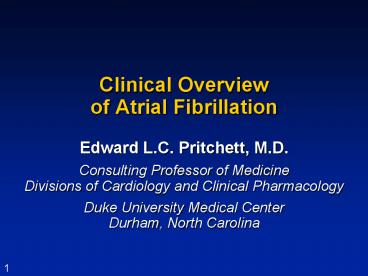Clinical Overview of Atrial Fibrillation - PowerPoint PPT Presentation
1 / 6
Title:
Clinical Overview of Atrial Fibrillation
Description:
1. Clinical Overview. of Atrial Fibrillation. Edward L.C. Pritchett, M.D. ... Complications (skin burns, aspiration, bradycardia, ventricular arrhythmia) ... – PowerPoint PPT presentation
Number of Views:225
Avg rating:3.0/5.0
Title: Clinical Overview of Atrial Fibrillation
1
Clinical Overview of Atrial Fibrillation
- Edward L.C. Pritchett, M.D.
- Consulting Professor of MedicineDivisions of
Cardiology and Clinical Pharmacology - Duke University Medical CenterDurham, North
Carolina
2
Atrial Fibrillation Prevalence
- Most common sustained cardiac arrhythmia1
- Most common diagnosis for arrhythmia-related
hospitalization2 - Estimated gt2.3 million US adults have AF3
- Prevalence of AF increases with age and with an
aging population4
1 Bialy D et al. J Am Coll Cardiol 1992
19-41A. 2 Fuster V et al. Circulation 2006
114e257-e354 3 Go AS et al. JAMA 2001
2852370-2375. 4 Chug SS et al. J Am Coll Cardiol
2001 37371-378
3
Clinical Presentation of Atrial Fibrillation
- Atrial fibrillation is most commonly identified
because patients have symptoms1 - The most appropriate use of antiarrhythmic drugs
in patients with atrial fibrillation is for
relief of symptoms2,3 - Symptoms closely associated with occurrence of
atrial fibrillation are palpitations, dyspnea,
chest pain, dizziness, asthenia, fatigue,
nervousness, increased sweating4
1 Psaty BM et al. Circulation 1997962455-2461. 2
Page RL. N Eng J Med 20043512408-2416 3 Fuster
V et al. Circulation 2006114e257-e354. 4
Bhandari AK et al. Am Heart J 1992124381-386.
4
Symptomatic Arrhythmias as an Outcome in
Antiarrhythmic Drug Approvals for Atrial
Fibrillation and Other Supraventricular
Arrhythmias
- 1986 verapamil PO IR - PSVT
- 1991 flecainide PO - PSVT, AF
- 1996 ibutilide IV - AF
- 1997 propafenone PO IR - PSVT, AF
- 1999 dofetilide PO - AF
- 2000 d,l sotalol PO - AF
- 2003 propafenone SR PO - AF
Pritchett E, PACE, 1998211457-1469.
5
Limitations of Current Therapies
- Pharmacological Conversion with
- IV Antiarrhythmic Drugs
- Few choices of approved and labeled drugs
- Imperfect efficacy
- Adverse effects (ventricular arrhythmias)
- Electrical Cardioversion
- Requires conscious sedation
- Complications (skin burns, aspiration,
bradycardia, ventricular arrhythmia) - Inappropriate in some clinical situations
(post-prandial, lung disease, recent cardiac
surgery)
6
Desirable Characteristics of Pharmacologic
Converting Agents
- Efficacy
- High rate of restoring sinus rhythm with relief
of symptoms - Rapid onset of action
- Safety
- Low rate of adverse effects
- Low incidence of drug interactions
- Lack of interference with electrical cardioversion































